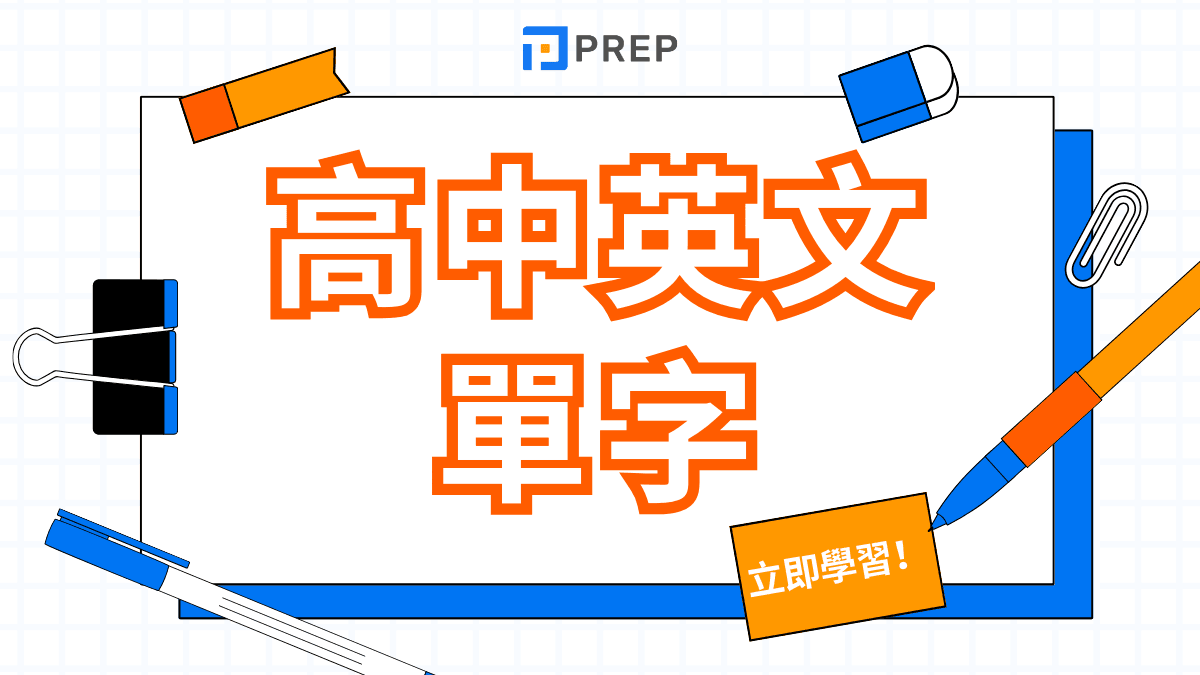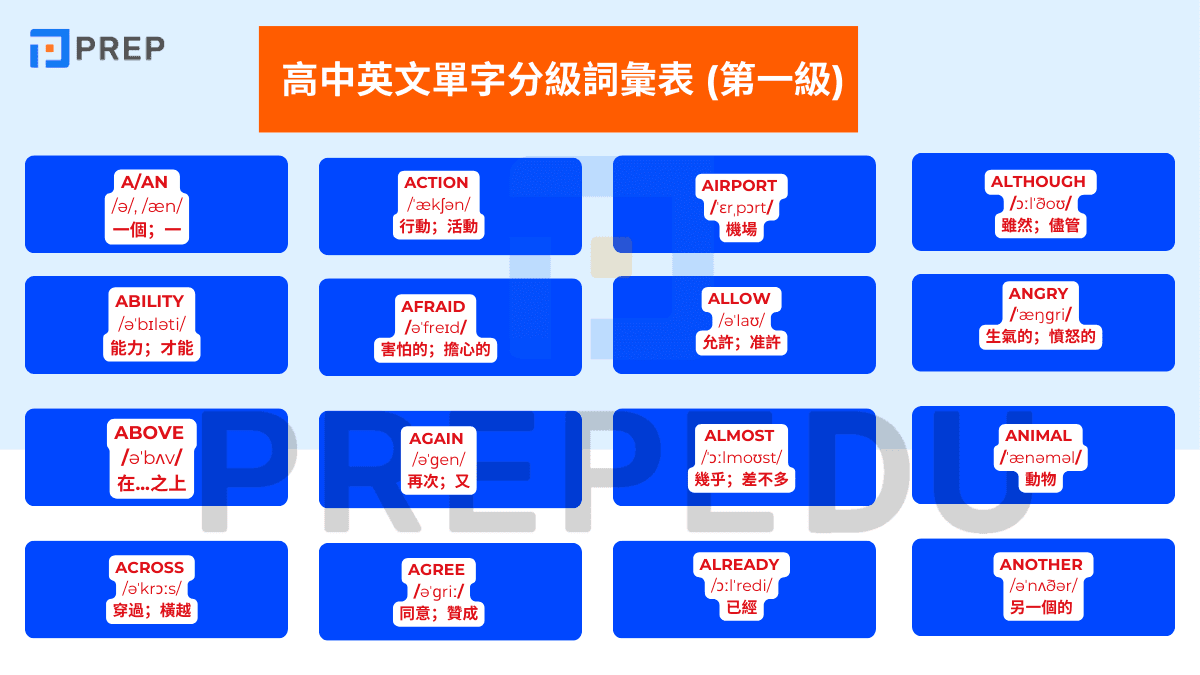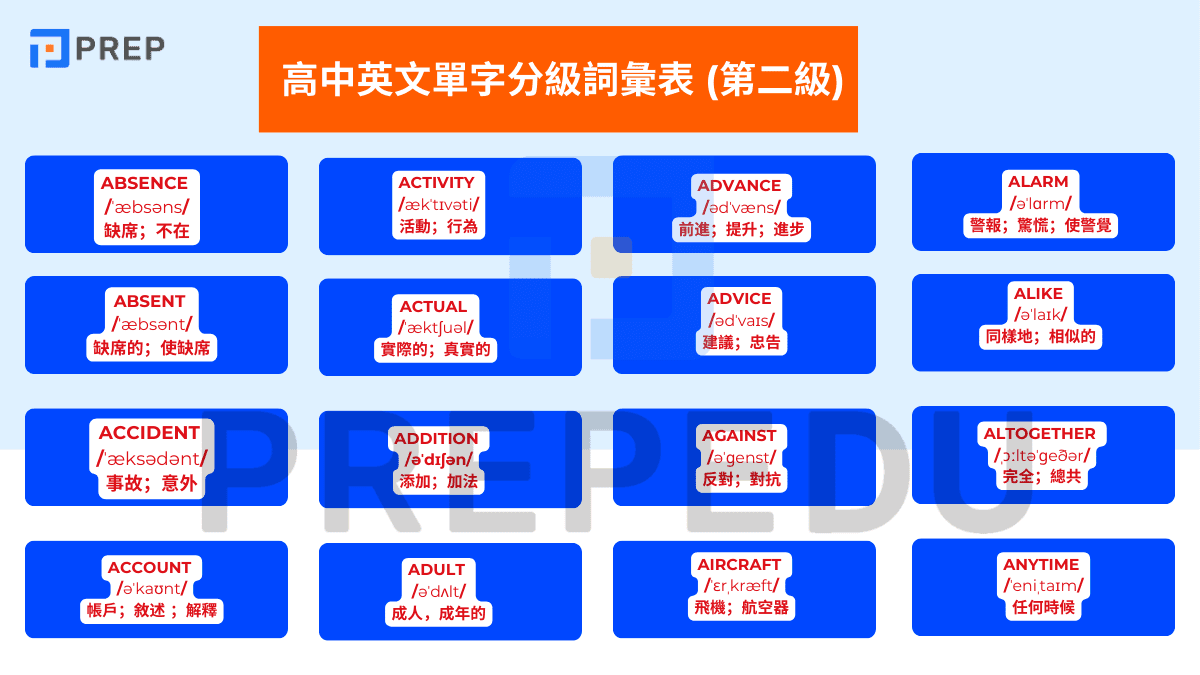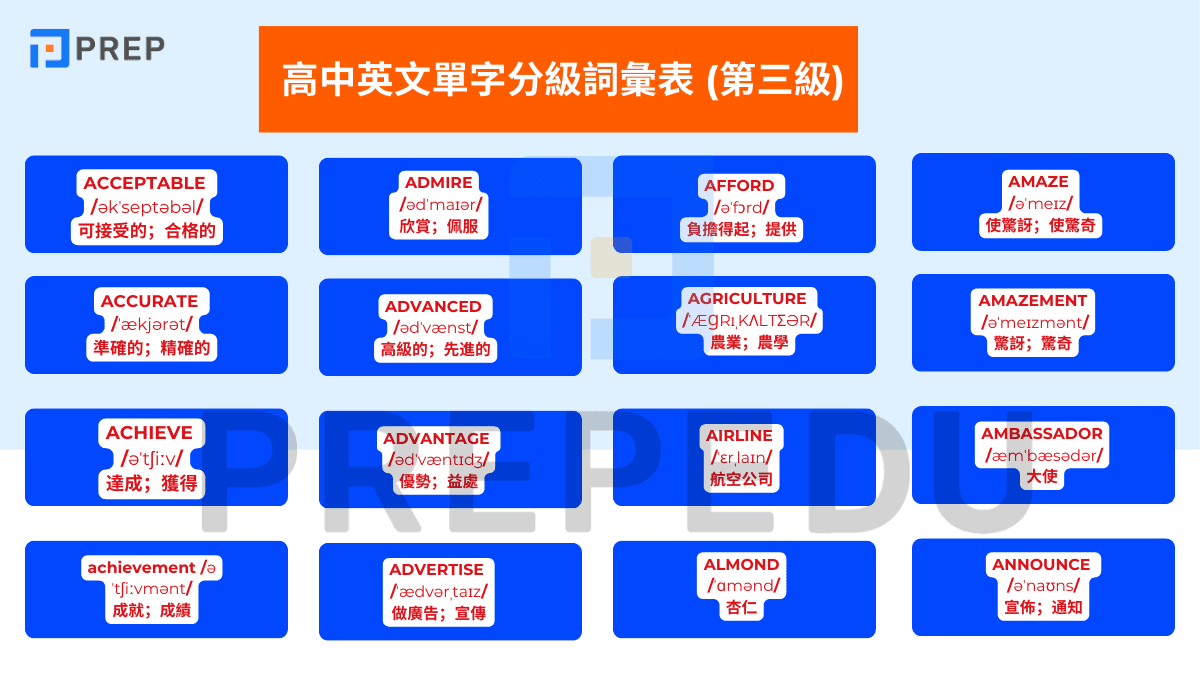高中英文單字完整攻略:必背詞彙表、分級學習法與高效記憶技巧
你是否常常疑惑:「高中英文單字有哪些必背詞彙?」答案是,高中英文單字通常涵蓋約 3000–5000 個核心單字,從基礎詞彙到進階學術用語,都是升學考試與實際英文應用的重要基石。正確掌握這些詞彙,不僅能幫助學生在學測、指考或 TOEIC、IELTS 等考試中取得好成績,也能奠定未來學術與職場英文的扎實基礎。
想像一下,若能透過分級學習法,將高中英文單字依照難度分層記憶,就像一階一階的階梯,讓你穩健地提升英文能力;再搭配高效記憶技巧,例如字根字首拆解、語境聯想或單字卡練習,學習將不再是死背,而是能靈活運用的語言能力。許多學生因為缺乏方法而覺得背單字困難,其實只要策略正確,就能大幅提升學習效率。
在本篇文章中,PREPEDU 將帶你完整掌握 高中英文單字:從必背詞彙表、分級學習法,到多種實用的記憶技巧,一次全面解析。我們的目標是幫助你不僅能牢牢記住單字,更能活用於閱讀、寫作與口說中,打造長期而穩固的英文實力。

I. 高中英文單字分級詞彙表
在展開高中英文單字的學習旅程前,選擇正確的學習材料是成功的關鍵第一步。教育部公布的7000單字分級表,不僅是高中課程的標準依據,更是各大升學考試命題的核心範圍。透過系統性的分級學習,你將能夠循序漸進地建構扎實的詞彙基礎,避免盲目背誦所帶來的低效困擾。
1. 第一級
第一級高中英文單字涵蓋日常生活中最基礎且高頻使用的詞彙,這些單字是建構英文表達能力的重要基石。掌握這個層級的詞彙,將為你後續的英文學習奠定穩固的根基。
|
高中英文單字 |
意思 |
例句 |
|
a/an /ə/, /æn/ (art.) |
一個;一 |
She bought a book and an apple. (她買了一本書和一個蘋果。) |
|
ability /əˈbɪləti/ (n.) |
能力;才能 |
Her ability to solve problems is remarkable. (她解決問題的能力很出色。) |
|
able /ˈeɪbəl/ (adj.) |
能夠的;有能力的 |
Are you able to finish this task today? (你今天能完成這個任務嗎?) |
|
about /əˈbaʊt/ (prep.) |
關於;大約 |
The book is about English learning methods. (這本書是關於英文學習方法。) |
|
above /əˈbʌv/ (prep.) |
在...之上 |
The temperature is above 30 degrees today. (今天氣溫超過30度。) |
|
abroad /əˈbrɔːd/ (adv.) |
在國外;到國外 |
Many students dream of studying abroad. (很多學生夢想出國留學。) |
|
across /əˈkrɔːs/ (prep.) |
穿過;橫越 |
The school is located across the street from the park. (學校位於公園街對面。) |
|
act /ækt/ (v.) |
行動;表演 n. 行為 |
You need to act quickly to solve this problem. (你需要迅速行動來解決這個問題。) |
|
action /ˈækʃən/ (n.) |
行動;活動 |
Taking immediate action is crucial for success. (立即採取行動對成功至關重要。) |
|
actor/actress /ˈæktər/, /ˈæktrəs/ (n.) |
男演員/女演員 |
The famous actor won an award last night. (這位著名演員昨晚獲獎了。) |
|
add /æd/ (v.) |
增加;添加 |
Please add more details to your report. (請在你的報告中添加更多細節。) |
|
afraid /əˈfreɪd/ (adj.) |
害怕的;擔心的 |
Don't be afraid to make mistakes when learning English. (學英文時不要害怕犯錯。) |
|
after /ˈæftər/ (prep.) |
在...之後 |
We will have lunch after the morning classes. (我們將在上午課程結束後吃午餐。) |
|
afternoon /ˌæftərˈnuːn/ (n.) |
下午 |
The meeting is scheduled for this afternoon. (會議安排在今天下午。) |
|
again /əˈɡen/ (adv.) |
再次;又 |
Let me explain the rule again. (讓我再解釋一次這個規則。) |
|
age /eɪdʒ/ (n.) |
年齡;時代 v. 變老 |
What age did you start learning English? (你幾歲開始學英文的?) |
|
ago /əˈɡoʊ/ (adv.) |
以前;之前 |
I started this course three months ago. (我三個月前開始這個課程。) |
|
agree /əˈɡriː/ (v.) |
同意;贊成 |
I agree with your opinion completely. (我完全同意你的觀點。) |
|
air /ɛr/ (n.) |
空氣;天空 |
The air in the mountains is very fresh. (山上的空氣很清新。) |
|
airplane/plane /ˈɛrˌpleɪn/, /pleɪn/ (n.) |
飛機 |
The airplane will depart at 8 AM tomorrow. (飛機將於明天上午8點起飛。) |
|
airport /ˈɛrˌpɔrt/ (n.) |
機場 |
Please arrive at the airport two hours early. (請提前兩小時到達機場。) |
|
all /ɔːl/ (adj.) |
所有的;全部的 |
All students need to complete their homework on time. (所有學生都需要按時完成作業。) |
|
allow /əˈlaʊ/ (v.) |
允許;准許 |
The teacher will allow students to use dictionaries during the test. (老師將允許學生在考試中使用字典。) |
|
almost /ˈɔːlmoʊst/ (adv.) |
幾乎;差不多 |
I have almost finished reading this book. (我差不多讀完這本書了。) |
|
along /əˈlɔːŋ/ (prep.) |
沿著 adv. 一起 |
We walked along the beautiful beach. (我們沿著美麗的海灘散步。) |
|
already /ɔːlˈredi/ (adv.) |
已經 |
Have you already submitted your assignment? (你已經提交作業了嗎?) |
|
also /ˈɔːlsoʊ/ (adv.) |
也;同樣地 |
She speaks English fluently and can also write very well. (她英文說得很流利,寫作能力也很好。) |
|
although /ɔːlˈðoʊ/ (conj.) |
雖然;儘管 |
Although it was raining, we continued our outdoor activity. (雖然下雨,我們還是繼續戶外活動。) |
|
always /ˈɔːlweɪz/ (adv.) |
總是;永遠 |
Good students always review their lessons before exams. (好學生總是在考試前複習功課。) |
|
and /ænd/ (conj.) |
和;並且 |
Reading and writing are essential skills for language learning. (閱讀和寫作是語言學習的必備技能。) |
|
angry /ˈæŋɡri/ (adj.) |
生氣的;憤怒的 |
The teacher was angry because students didn't pay attention. (老師很生氣,因為學生們不專心。) |
|
animal /ˈænəməl/ |
動物 |
The zoo has many different kinds of animals. (動物園有許多不同種類的動物。) |
|
another /əˈnʌðər/ (adj.) |
另一個的 |
Could you give me another example? (你能再給我一個例子嗎?) |
|
answer /ˈænsər/ (n.) |
答案 v. 回答 |
Please write your answer on the test paper. (請把你的答案寫在考卷上。) |
|
any /ˈeni/ (adj.) |
任何的;一些 |
Do you have any questions about today's lesson? (你對今天的課程有任何問題嗎?) |
|
anybody/anyone /ˈeniˌbɑdi/, /ˈeniˌwʌn/ (pron.) |
任何人 |
Anyone can learn English with enough practice. (任何人只要足夠練習都能學會英文。) |
|
anything /ˈeniˌθɪŋ/ (pron.) |
任何事物 |
Is there anything you don't understand? (有什麼你不明白的嗎?) |
|
appear /əˈpɪr/ (v.) |
出現;似乎 |
The answer will appear on the screen shortly. (答案很快就會出現在螢幕上。) |
|
apple /ˈæpəl/ (n.) |
蘋果 |
An apple a day keeps the doctor away. (一天一蘋果,醫生遠離我。) |
|
area /ˈɛriə/ (n.) |
地區;面積 |
This area is famous for its beautiful scenery. (這個地區以美麗的風景而聞名。) |
|
arm /ɑrm/ (n.;v.) |
手臂;武裝 |
She raised her arm to ask a question. (她舉手問問題。) |
|
around /əˈraʊnd/ (prep.;adv.) |
在...周圍;四處 |
There are many restaurants around the school. (學校周圍有很多餐廳。) |
|
arrive /əˈraɪv/(v.) |
到達;抵達 |
What time did you arrive at the party? (你幾點到達派對的?) |
|
art /ɑrt/(n.) |
藝術;美術 |
She is studying art at the university. (她在大學學習藝術。) |
|
as /æz/ (conj./ prep.) |
當...時;因為;作為 |
As a student, you should focus on your studies. (作為學生,你應該專注於學習。) |
|
ask /æsk/(v.) |
詢問;要求 |
Don't hesitate to ask your teacher when you don't understand. (當你不理解時,不要猶豫向老師詢問。) |
|
at /æt/(prep.) |
在;於 |
The English club meets at 3 PM every Friday. (英文社團每週五下午3點聚會。) |
|
attack /əˈtæk/ (v./ n.) |
攻擊;攻擊 |
The lion will attack if it feels threatened. (獅子感到威脅時會攻擊。) |
|
away /əˈweɪ/(adv.) |
離開;遠離 |
Please put your phone away during class. (上課時請把手機收起來。) |
|
baby /ˈbeɪbi/(n.) |
嬰兒;寶寶 |
The baby is sleeping peacefully. (嬰兒正在安靜地睡覺。) |
|
back /bæk/ (adv./ n./ adj.) |
回來;背部;後面的 |
When will you come back from vacation? (你什麼時候度假回來?) |
|
bad /bæd/ (adj.) |
壞的;糟糕的 |
That was a bad decision. (那是個糟糕的決定。) |
|
ball /bɔːl/ (n.) |
球;舞會 |
The children are playing with a ball in the park. (孩子們正在公園裡玩球。) |
|
be /biː/ (v.) |
是;存在 |
Practice is the key to mastering any language skill. (練習是掌握任何語言技能的關鍵。) |

2. 第二級
第二級高中英文單字在第一級基礎上增加了更多學術性與專業性詞彙,這些單字經常出現在高中課本及各類考試中。熟練掌握這個層級的詞彙,將顯著提升你的英文理解與表達能力。
|
高中英文單字 |
意思 |
例句 |
|
absence /ˈæbsəns/ (n.) |
缺席;不在 |
His absence from class was noticed by everyone. (他的缺課被每個人都注意到了。) |
|
absent /ˈæbsənt/ (adj./ v.) |
缺席的;使缺席 |
Three students were absent from today's English lesson. (三名學生今天英文課缺席。) |
|
accept /əkˈsept/ (v.) |
接受;承認 |
We must accept that learning English requires consistent effort. (我們必須接受學習英文需要持續努力的事實。) |
|
accident /ˈæksədənt/ (n.) |
事故;意外 |
The traffic accident caused a delay in our schedule. (交通事故使我們的行程延誤。) |
|
account /əˈkaʊnt/ (n./ v.) |
帳戶;敘述 ;解釋 |
Can you account for your poor performance this semester? (你能解釋這學期表現不佳的原因嗎?) |
|
active /ˈæktɪv/ (adj.) |
積極的;活躍的 |
Active participation in class discussions improves language skills. (積極參與課堂討論能提升語言技能。) |
|
activity /ækˈtɪvəti/ (n.) |
活動;行為 |
Group discussion is an effective learning activity for practicing English. (小組討論是練習英文的有效學習活動。) |
|
actual /ˈæktʃuəl/ (adj.) |
實際的;真實的 |
The actual exam was much easier than the practice tests. (實際考試比模擬測試簡單許多。) |
|
addition /əˈdɪʃən/ (n.) |
添加;加法 |
In addition to English, she also studies French. (除了英文之外,她還學法文。) |
|
address /əˈdres/ (v./ n.) |
處理;演說;地址 |
The teacher will address common grammar mistakes in tomorrow's lesson. (老師將在明天的課程中處理常見的文法錯誤。) |
|
admit /ədˈmɪt/ (v.) |
承認;允許進入 |
He had to admit that he didn't study hard enough. (他不得不承認自己學習不夠努力。) |
|
adult /əˈdʌlt/ (n./ adj. ) |
成人,成年的 |
Adult learners often have different motivations for studying English. (成人學習者學習英文的動機往往不同。) |
|
advance /ədˈvæns/ (v./ n.) |
前進;提升;進步 |
Consistent practice will help you advance your English proficiency quickly. (持續練習將幫助你快速提升英文能力。) |
|
advice /ədˈvaɪs/ (n.) |
建議;忠告 |
The teacher gave us valuable advice on improving our writing skills. (老師給了我們提升寫作技能的寶貴建議。) |
|
affair /əˈfɛr/ (n.) |
事件;事務 |
The school affair was handled professionally by the administration. (學校事務由行政部門專業處理。) |
|
affect /əˈfekt/ (v.) |
影響;感動 |
Positive learning environments can profoundly affect student motivation. (積極的學習環境能深刻影響學生動機。) |
|
against /əˈɡenst/ (prep.) |
反對;對抗 |
Many students are against the new examination policy. (許多學生反對新的考試政策。) |
|
ahead /əˈhed/ (adv.) |
向前;在前面 |
The advanced students are always one step ahead in their learning. (優秀的學生在學習上總是領先一步。) |
|
aid /eɪd/ (n.;v.) |
幫助;援助;幫助 |
Visual aids make complex grammar rules easier to understand. (視覺輔助讓複雜的文法規則更容易理解。) |
|
aim /eɪm/ (n./v. ) |
目標;目的;瞄準 |
The aim of this course is to improve your speaking confidence. (這門課程的目標是提升你的口語信心。) |
|
aircraft /ˈɛrˌkræft/ (n.) |
飛機;航空器 |
The aircraft industry requires many English-speaking professionals. (航空業需要許多會說英文的專業人士。) |
|
alarm /əˈlɑrm/ (n.;v.) |
警報;驚慌;使警覺 |
The fire alarm interrupted our English presentation. (火警警報打斷了我們的英文報告。) |
|
album /ˈælbəm/ (n.) |
相簿;專輯 |
She showed us her photo album from her trip to England. (她給我們看她英國旅行的相簿。) |
|
alike /əˈlaɪk/ (adv.; adj.) |
同樣地;相似的 |
All successful language learners are alike in their dedication. (所有成功的語言學習者在專注方面都很相似。) |
|
alive /əˈlaɪv/ (adj.) |
活著的;活躍的 |
The classroom atmosphere came alive during the interactive lesson. (在互動課程中,教室氣氛變得活躍起來。) |
|
alone /əˈloʊn/ (adj.; adv.) |
獨自的; 單獨地 |
You don't have to study English alone; join our study group. (你不必獨自學英文;加入我們的學習小組吧。) |
|
aloud /əˈlaʊd/ (adv.) |
大聲地 |
Please read the passage aloud so everyone can hear. (請大聲朗讀這段文章,讓每個人都能聽到。) |
|
altogether /ˌɔːltəˈɡeðər/ (adv.) |
完全;總共 |
There are 30 students altogether in our English class. (我們英文班總共有30名學生。) |
|
among /əˈmʌŋ/ (prep.) |
在...之中 |
English is among the most widely spoken languages in the world. (英文是世界上使用最廣泛的語言之一。) |
|
amount /əˈmaʊnt/ (n.; v.) |
數量;總數;等於 |
A large amount of practice is needed to master pronunciation. (掌握發音需要大量練習。) |
|
ancient /ˈeɪnʃənt/ (adj.) |
古代的;古老的 |
We studied ancient English literature in our advanced course. (我們在進階課程中學習古代英國文學。) |
|
anger /ˈæŋɡər/ (n.) |
憤怒;生氣 |
His anger was visible when students didn't pay attention. (當學生不專心時,他的憤怒很明顯。) |
|
angle /ˈæŋɡəl/ (n.) |
角度;觀點 |
Looking at grammar from a different angle can make it easier to understand. (從不同角度看文法可以讓它更容易理解。) |
|
anytime /ˈeniˌtaɪm/ (adv.) |
任何時候 |
You can ask me questions anytime during office hours. (你可以在辦公時間隨時問我問題。) |
|
anyway /ˈeniˌweɪ/ (adv.) |
無論如何;不管怎樣 |
The test was difficult, but we passed anyway. (考試很難,但我們還是通過了。) |
|
anywhere /ˈeniˌwɛr/ (adv.) |
任何地方 |
With online resources, you can study English anywhere. (有了線上資源,你可以在任何地方學英文。) |
|
appear /əˈpɪr/ (v.) |
出現;似乎 |
New vocabulary words appear in every chapter of the textbook. (教科書的每一章都出現新的詞彙。) |
|
appearance /əˈpɪrəns/ (n.) |
外表;出現 |
Her confident appearance during the presentation impressed everyone. (她在報告中自信的表現讓每個人印象深刻。) |
|
appetite /ˈæpəˌtaɪt/ (n.) |
食慾;欲望 |
Reading English novels increases your appetite for learning more. (閱讀英文小說增加你學習更多的欲望。) |
|
apply /əˈplaɪ/ (v.) |
申請;應用 |
Students need to apply grammar rules correctly in their writing. (學生需要在寫作中正確應用文法規則。) |
|
appreciate /əˈpriːʃiˌeɪt/ (v.) |
欣賞;感謝 |
I appreciate your help with my English homework. (我感謝你幫助我做英文作業。) |
|
approach /əˈproʊtʃ/ (v./ n. ) |
接近;處理;方法 |
We need a new approach to teaching vocabulary effectively. (我們需要一種新方法來有效地教授詞彙。) |
|
argue /ˈɑrɡyu/ (v.) |
爭論;主張 |
Students argued about the best method for learning pronunciation. (學生們爭論學習發音的最佳方法。) |
|
army /ˈɑrmi/ (n.) |
軍隊;大群 |
An army of dedicated students joined the English competition. (一大群專注的學生參加了英文競賽。) |
|
arrange /əˈreɪndʒ/ (v.) |
安排;整理 |
The teacher will arrange extra practice sessions for struggling students. (老師將為有困難的學生安排額外的練習課程。) |
|
arrival /əˈraɪvəl/ (n.) |
到達;抵達 |
The arrival of the exchange students excited everyone. (交換學生的到來讓每個人都很興奮。) |
|
arrow /ˈæroʊ/ (n.) |
箭;箭頭 |
Follow the arrow to find the correct answer on the worksheet. (跟著箭頭在工作表上找到正確答案。) |
|
article /ˈɑrtəkəl/ (n.) |
文章;物品 |
This article explains the importance of daily English practice. (這篇文章解釋每日英文練習的重要性。) |
|
artist /ˈɑrtəst/ (n.) |
藝術家 |
The famous artist spoke about creativity in both English and Chinese. (這位著名藝術家用英文和中文談論創造力。) |
|
asleep /əˈsliːp/ (adj.) |
睡著的 |
Some students fell asleep during the boring lecture. (一些學生在無聊的講座中睡著了。) |
|
attempt /əˈtempt/ (n./ v.) |
嘗試; 試圖 |
Her first attempt at the speaking test was successful. (她第一次嘗試口語測試就成功了。) |
|
attend /əˈtend/ (v.) |
出席;參加 |
All students must attend the English workshop next week. (所有學生必須參加下週的英文研習會。) |
|
attention /əˈtenʃən/ (n.) |
注意;關注 |
Please pay attention to the pronunciation of these words. (請注意這些單字的發音。) |
|
author /ˈɔːθər/ (n./ v. ) |
作者;創作 |
The author of this textbook has 20 years of teaching experience. (這本教科書的作者有20年的教學經驗。) |
|
available /əˈveɪləbəl/ (adj.) |
可獲得的;有空的 |
Online dictionaries are available 24 hours a day. (線上字典每天24小時都可使用。) |
|
average /ˈævərɪdʒ/ (adj./ n.) |
平均的;平均數 |
The average score on the English test was 85 points. (英文測驗的平均分數是85分。) |
|
avoid /əˈvɔɪd/ (v.) |
避免;逃避 |
Try to avoid using your native language during English class. (在英文課上儘量避免使用母語。) |

3. 第三級
第三級高中英文單字標誌著詞彙學習的重要轉折點,這些單字具有更高的學術價值與實用性。掌握第三級詞彙將為你在高中階段的各科學習提供強有力的語言支撐,同時為未來的大學學習做好充分準備。
|
高中英文單字 |
意思 |
例句 |
|
aboard /əˈbɔrd/ (prep.) |
在船上;在飛機上 |
All passengers are now aboard the flight to London. (所有乘客現在都在飛往倫敦的班機上。) |
|
acceptable /əkˈseptəbəl/ (adj.) |
可接受的;合格的 |
Your English pronunciation is acceptable for this level. (你的英文發音對這個級別來說是可以接受的。) |
|
accurate /ˈækjərət/ (adj.) |
準確的;精確的 |
Providing accurate information is essential for effective communication. (提供準確資訊對有效溝通至關重要。) |
|
ache /eɪk/ (n./ v.) |
疼痛; 疼痛 |
My head began to ache after studying for six hours straight. (連續讀書六小時後,我開始頭痛。) |
|
achieve /əˈtʃiːv/ (v.) |
達成;獲得 |
Students who set clear objectives are more likely to achieve their desired results. (設定明確目標的學生更可能達成理想結果。) |
|
achievement /əˈtʃiːvmənt/ |
成就;成績 |
Winning the English speech contest was her greatest achievement. (贏得英文演講比賽是她最大的成就。) |
|
additional /əˈdɪʃənəl/ (adj.) |
額外的;附加的 |
Students need additional practice to master advanced grammar. (學生需要額外練習來掌握進階文法。) |
|
admire /ədˈmaɪər/ (v.) |
欣賞;佩服 |
I admire students who never give up despite difficulties. (我佩服那些面對困難永不放棄的學生。) |
|
advanced /ədˈvænst/ (adj.) |
高級的;先進的 |
The advanced English course covers complex literary analysis. (高級英文課程涵蓋複雜的文學分析。) |
|
advantage /ədˈvæntɪdʒ/ (n.) |
優勢;益處 |
Bilingual speakers have a significant advantage in today's global marketplace. (雙語使用者在當今全球市場中具有顯著優勢。) |
|
adventure /ədˈventʃər/ (n.) |
冒險;奇遇 |
Learning English can be an exciting adventure full of discoveries. (學習英文可以是一場充滿發現的精彩冒險。) |
|
advertise /ˈædvərˌtaɪz/ (v.) |
做廣告;宣傳 |
Schools often advertise their English programs to attract students. (學校經常宣傳他們的英文課程來吸引學生。) |
|
advertisement/ad /ədˈvɜrtəsmənt/, /æd/ (n.) |
廣告 |
This advertisement promotes a new English learning app. (這個廣告推廣一個新的英文學習應用程式。) |
|
advise /ədˈvaɪz/ (v.) |
建議;勸告 |
Teachers advise students to read English books regularly. (老師建議學生定期閱讀英文書籍。) |
|
adviser/advisor /ədˈvaɪzər/ (n.) |
顧問;指導老師 |
The academic adviser helped me choose the right English courses. (學術顧問幫助我選擇合適的英文課程。) |
|
afford /əˈfɔrd/ (v.) |
負擔得起;提供 |
Many students cannot afford expensive English courses. (許多學生負擔不起昂貴的英文課程。) |
|
afterward/afterwards /ˈæftərwərd/ (adv.) |
後來;之後 |
We studied grammar first, and afterward practiced speaking. (我們先學文法,之後練習口語。) |
|
agriculture /ˈæɡrɪˌkʌltʃər/ (n.) |
農業;農學 |
Modern agriculture relies heavily on technology and scientific research. (現代農業嚴重依賴科技和科學研究。) |
|
airline /ˈɛrˌlaɪn/ (n.) |
航空公司 |
The international airline requires all staff to speak fluent English. (這家國際航空公司要求所有員工說流利的英文。) |
|
alley /ˈæli/ (n.) |
小巷;胡同 |
The bookstore is located in a narrow alley behind the school. (書店位於學校後面的一條狹窄小巷裡。) |
|
almond /ˈɑmənd/ (n.) |
杏仁 |
Almonds are a healthy snack that provides energy for studying. (杏仁是健康的零食,為學習提供能量。) |
|
alphabet /ˈælfəˌbet/ (n.) |
字母表 |
Children learn the English alphabet before they start reading. (孩子們在開始閱讀前先學習英文字母表。) |
|
amaze /əˈmeɪz/ (v.) |
使驚訝;使驚奇 |
It continues to amaze me how quickly children learn languages. (孩子們學習語言的速度持續讓我驚訝。) |
|
amazement /əˈmeɪzmənt/ (n.) |
驚訝;驚奇 |
She watched in amazement as her English improved dramatically. (她驚訝地看著自己的英文急劇進步。) |
|
ambassador /æmˈbæsədər/ (n.) |
大使 |
The ambassador delivered his speech in perfect English. (大使用完美的英文發表演講。) |
|
ambition /æmˈbɪʃən/ (n.) |
野心;抱負 |
Her ambition is to become a professional English translator. (她的抱負是成為專業的英文翻譯。) |
|
ambulance /ˈæmbjələns/ (n.) |
救護車 |
The ambulance arrived quickly at the scene of the accident. (救護車很快到達事故現場。) |
|
angel /ˈeɪndʒəl/ (n.) |
天使 |
My English teacher is like an angel who patiently helps everyone. (我的英文老師就像天使一樣耐心地幫助每個人。) |
|
announce /əˈnaʊns/ (v.) |
宣佈;通知 |
The principal will announce the English competition results tomorrow. (校長將於明天宣佈英文競賽結果。) |
|
announcement /əˈnaʊnsmənt/ (n.) |
公告;宣佈 |
Please listen carefully to this important announcement about the exam. (請仔細聽這個關於考試的重要公告。) |
|
anxious /ˈæŋkʃəs/ (adj.) |
焦慮的;急切的 |
Students often feel anxious before important English tests. (學生在重要的英文測驗前經常感到焦慮。) |
|
anyhow /ˈeniˌhaʊ/ (adv.) |
無論如何;不管怎樣 |
The grammar is complicated, but we'll learn it anyhow. (文法很複雜,但我們無論如何都要學會。) |
|
apart /əˈpɑrt/ (adv.) |
分開;相距 |
The two English classes are held apart from each other. (兩個英文班級分開上課。) |
|
apologize /əˈpɑləˌdʒaɪz/ (v.) |
道歉;賠罪 |
Students should apologize when they make mistakes in class. (學生在課堂上犯錯時應該道歉。) |
|
appeal /əˈpiːl/ (n./ v.) |
呼籲;吸引力;呼籲 |
The teacher's appeal for quiet was ignored by the noisy students. (老師要求安靜的呼籲被吵鬧的學生忽視了。) |
|
approve /əˈpruv/ (v.) |
贊成;批准 |
Parents must approve their children's participation in the English camp. (家長必須批准孩子們參加英文夏令營。) |
|
apron /ˈeɪprən/ (n.) |
圍裙 |
The cooking class instructor wore a clean white apron. (烹飪課講師穿著乾淨的白色圍裙。) |
|
armed /ɑrmd/ (adj.) |
武裝的;配備的 |
Students came to class armed with dictionaries and notebooks. (學生們帶著字典和筆記本來上課。) |
|
arrest /əˈrest/ (v./ n.) |
逮捕;逮捕 |
The police will arrest anyone who violates the law. (警察會逮捕任何違法的人。) |
|
ash /æʃ/ (n.) |
灰燼;灰 |
After the fire, only ash remained of the old library. (火災後,舊圖書館只剩下灰燼。) |
|
aside /əˈsaɪd/ (adv.) |
在旁邊;除了 |
Please set your phones aside during the English lesson. (請在英文課期間把手機放在一邊。) |
|
assist /əˈsɪst/ (v.) |
協助;幫助 |
Volunteer students assist newcomers with their English studies. (志工學生協助新來的學生學習英文。) |
|
assistant /əˈsɪstənt/ (n.) |
助手;助理 |
The teaching assistant helps students with pronunciation practice. (教學助理幫助學生練習發音。) |
|
assume /əˈsum/ (v.) |
假設;承擔 |
Don't assume that learning English will be easy without effort. (不要假設不努力就能輕鬆學會英文。) |
|
athlete /ˈæθˌlit/ (n.) |
運動員 |
The professional athlete gave interviews in both English and Chinese. (這位職業運動員用英文和中文接受採訪。) |
|
attitude /ˈætəˌtud/ (n.) |
態度;看法 |
A positive attitude is essential for successful language learning. (積極的態度對成功的語言學習至關重要。) |
|
attract /əˈtrækt/ (v.) |
吸引;引起 |
Interactive teaching methods attract students' attention effectively. (互動教學法有效吸引學生的注意力。) |
|
attractive /əˈtræktɪv/ (adj.) |
有吸引力的;迷人的 |
The attractive presentation made the lesson more interesting. (有吸引力的簡報讓課程更有趣。) |
|
audience /ˈɔdiəns/ (n.) |
觀眾;聽眾 |
The audience applauded after the English drama performance. (觀眾在英文戲劇表演後鼓掌。) |
|
automatic /ˌɔtəˈmætɪk/ (adj.) |
自動的;機械的 |
With practice, correct pronunciation becomes automatic. (透過練習,正確發音變得自然而然。) |
|
automobile/auto /ˈɔtəməˌbil/, /ˈɔtoʊ/ (n.) |
汽車 |
The automobile industry requires engineers who speak technical English. (汽車工業需要會說技術英文的工程師。) |
|
avenue /ˈævəˌnu/ (n.) |
大街;途徑 |
Learning English opens up many avenues for career opportunities. (學習英文為職業機會開啟許多途徑。) |
|
awake /əˈweɪk/ (adj.) |
醒著的 v. 醒來 |
Stay awake during the important grammar explanation. (在重要的文法解釋期間保持清醒。) |
|
awaken /əˈweɪkən/ (v.) |
喚醒;覺醒 |
Traveling abroad can awaken your interest in learning English. (出國旅行能喚醒你學習英文的興趣。) |
|
award /əˈwɔrd/ (n.) |
獎項 v. 授予 |
She received an award for excellence in English writing. (她因英文寫作優秀而獲獎。) |
|
aware /əˈwɛr/ (adj.) |
意識到的;知道的 |
Students should be aware of common pronunciation mistakes. (學生應該意識到常見的發音錯誤。) |
|
awful /ˈɔfəl/ (adj.) |
可怕的;極糟的 |
The student's awful pronunciation needed immediate correction. (這個學生可怕的發音需要立即糾正。) |
|
awkward /ˈɔkwərd/ (adj.) |
尷尬的;笨拙的 |
Many beginners feel awkward when speaking English in public. (許多初學者在公開場合說英文時感到尴尬。) |

4. 第四級
第四級高中英文單字代表著進階詞彙的掌握程度,這些單字經常出現在學術文章、正式文件與專業領域中。精通第四級詞彙將大幅提升你的英文閱讀理解能力,並為參與更深層次的英文討論做好準備。
|
高中英文單字 |
意思 |
例句 |
|
abstract /ˈæbstrækt/ (adj./ n.) |
抽象的;摘要 |
Abstract concepts in literature require careful analysis and interpretation. (文學中的抽象概念需要仔細分析和詮釋。) |
|
accelerate /əkˈseləreɪt/ (v.) |
加速;促進 |
Technology can significantly accelerate the language learning process. (科技能顯著加速語言學習過程。) |
|
accommodate /əˈkɑːmədeɪt/ (v.) |
容納;適應 |
Modern teaching methods can accommodate different learning styles effectively. (現代教學方法能有效適應不同的學習風格。) |
|
accumulate /əˈkjuːmjəleɪt/ (v.) |
積累;累積 |
Vocabulary knowledge tends to accumulate gradually through consistent reading habits. (詞彙知識往往透過持續的閱讀習慣逐漸積累。) |
|
acknowledge /əkˈnɑːlɪdʒ/ (v.) |
承認;確認 |
Successful learners acknowledge their mistakes and learn from them constructively. (成功的學習者承認錯誤並從中建設性地學習。) |
|
adequate /ˈædɪkwət/ (adj.) |
充足的;合適的 |
Adequate sleep is crucial for optimal cognitive performance during exams. (充足睡眠對考試期間的最佳認知表現至關重要。) |
|
advocate /ˈædvəkeɪt/ (v./ v.) |
提倡;支持;倡導者 |
Educational experts advocate for integrated approaches to language instruction. (教育專家提倡整合性的語言教學方法。) |
|
affect /əˈfekt/ (v.) |
影響;感動 |
Positive learning environments can profoundly affect student motivation and achievement. (積極的學習環境能深刻影響學生的動機和成就。) |
|
allocate /ˈæləkeɪt/ (v.) |
分配;撥出 |
Effective students know how to allocate their study time wisely across different subjects. (有效率的學生知道如何明智地分配不同科目的讀書時間。) |
|
alternative /ɔːlˈtɜːrnətɪv/ (adj.; n.) |
替代的; 選擇 |
Online platforms provide valuable alternative methods for practicing English conversation. (線上平台為練習英文對話提供寶貴的替代方法。) |
5. 第五級
第五級高中英文單字是詞彙學習的最高層級,這些單字具有高度的專業性與學術價值。熟練運用第五級詞彙不僅能讓你在各類英文檢定中脫穎而出,更將為你的大學學習與未來職業發展奠定堅實的語言基礎。
|
高中英文單字 |
意思 |
例句 |
|
abandon /əˈbændən/ (v.) |
放棄;遺棄 |
Never abandon your dreams despite temporary setbacks in your learning journey. (儘管在學習旅程中遇到暫時挫折,永遠不要放棄夢想。) |
|
abolish /əˈbɑːlɪʃ/ (v.) |
廢除;取消 |
Progressive educators seek to abolish outdated teaching methods that hinder student creativity. (進步的教育者致力廢除阻礙學生創造力的過時教學方法。) |
|
absorb /əbˈzɔːrb/ (v.) |
吸收;專心於 |
Active learners can absorb new information more effectively through hands-on practice. (主動學習者能透過實作練習更有效地吸收新資訊。) |
|
abstract /ˈæbstrækt/ (adj.) |
抽象的;理論的 |
Abstract thinking skills are essential for advanced problem-solving in academic contexts. (抽象思維技能對學術環境中的進階問題解決至關重要。) |
|
abundant /əˈbʌndənt/ (adj.) |
豐富的;大量的 |
The internet provides abundant resources for self-directed English learning. (網際網路為自主英文學習提供豐富資源。) |
|
accelerate /əkˈseləreɪt/ (v.) |
加速;催促 |
Immersive language experiences can dramatically accelerate fluency development. (沉浸式語言體驗能戲劇性地加速流利度發展。) |
|
accessible /əkˈsesəbl/ (adj.) |
可接近的;易懂的 |
Quality education should be accessible to students from all socioeconomic backgrounds. (優質教育應該讓所有社經背景的學生都能接觸。) |
|
accommodate /əˈkɑːmədeɪt/ (v.) |
調節;適應 |
Flexible curriculum design can accommodate diverse learning preferences and abilities. (彈性課程設計能適應多樣化的學習偏好和能力。) |
|
accompany /əˈkʌmpəni/ (v.) |
陪同;伴隨 |
Visual representations should accompany complex textual explanations for better comprehension. (視覺呈現應該伴隨複雜的文字說明以獲得更好的理解。) |
|
accumulate /əˈkjuːmjəleɪt/ (v.) |
累積;聚集 |
Consistent daily practice allows students to accumulate substantial vocabulary knowledge over time. (持續的每日練習讓學生隨著時間累積大量詞彙知識。) |
II. 【立即下載】高中英文單字表(多格式整合,一鍵取用)
為了讓你能夠隨時隨地進行高中英文單字的複習與練習,PREP特別整理了完整的官方7000單字表。PDF完整版單字表 - 這個版本特別適合喜歡紙本學習或需要離線復習的同學。完整的PDF檔案包含所有7000個單字的詳細資訊,包括國際音標、詞性標註、中文翻譯,以及精選例句。你可以直接列印使用,或在平板電腦上進行數位標註,創造屬於自己的個人化學習筆記。
高中英文單字下載:這裡
結論
掌握高中英文單字的過程需要時間、耐心,以及正確的方法。透過系統性的分級學習與科學的記憶技巧,你將發現原本令人怯步的7000個單字,其實是開啟更廣闊世界的鑰匙。記住,每一個你今天背下的單字,都是明天成功路上的堅實墊腳石。持續前進,你的努力終將開花結果。
您正為不熟悉雅思測驗或多益測驗格式而感到擔憂嗎?別讓考試當天的陌生感影響您應得的成績。PREP 的 Test Practice 提供 100% 真實的模擬考試環境,協助您熟悉每種題型和時間壓力,如同真正考試一般。
透過超過 1000 道持續更新的練習題目,緊跟最新趨勢,您將接觸到近期考試中出現機率最高的主題。智慧 AI 系統深度分析每個錯誤,提供具體建議讓您快速改善。
特別值得一提的是,視覺化進度追蹤功能讓您清楚看見每次練習後的明顯進步。別讓超越競爭對手的機會從指縫溜走——立即開始使用 PREP Test Practice 練習,自信踏入考場!
現在就免費體驗 PREP 的 Test Practice!

你好!我叫黃秋賢。現在在網站 prepedu.com 的部落格擔任產品內容經理。
我有超過5年的英語、韓語等外語自學經驗,並準備過 IELTS、TOEIC、TOPIK 等考試,累積了豐富的實戰知識,也曾協助數千位在語言學習上遇到困難的人。希望以上的分享能幫助大家在家中更有效率地自學!
評論











